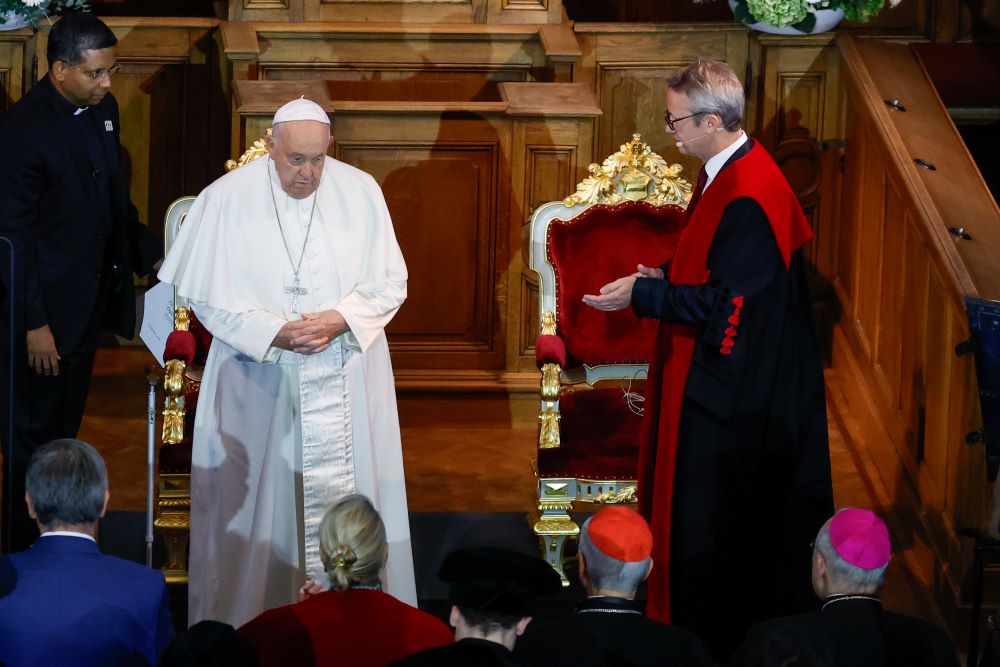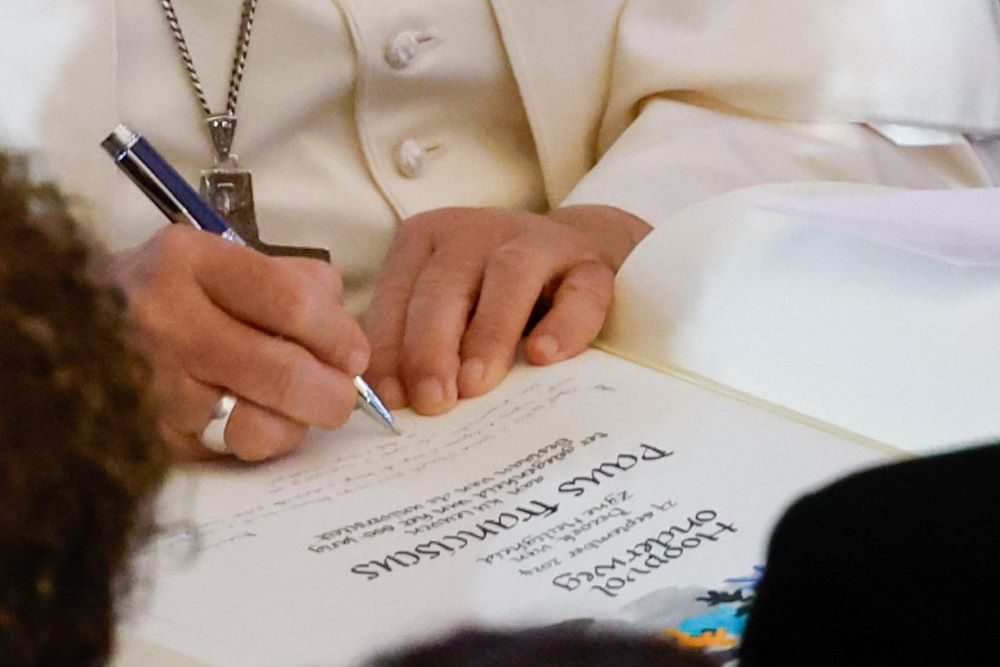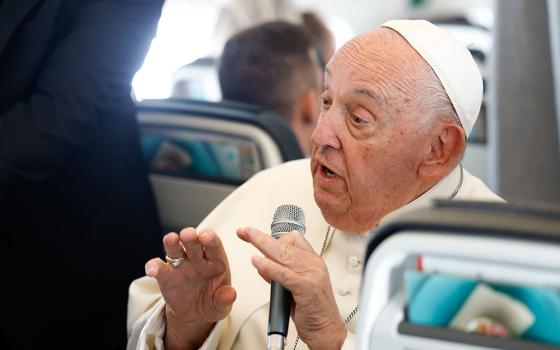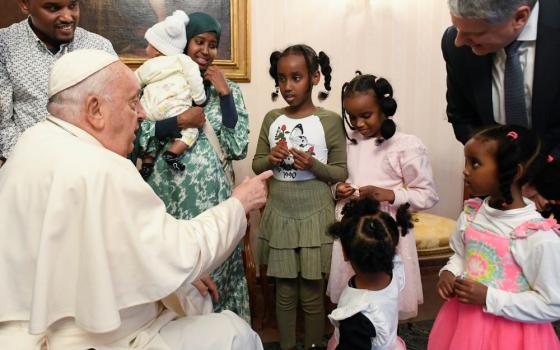
Pope Francis is welcomed to the Catholic University of Leuven (KU Lueven) in the city of Leuven, Belgium, Sept. 27, by Luc Sels, rector and vice-chancellor. Founded in 1425 with a decree by Pope Martin V, Leuven is the oldest Catholic university in the world. (CNS/Lola Gomez)
During a Sept. 27 visit to one of the Catholic Church's most storied universities, Pope Francis heard pleas for the church to reconsider its stance against the ordination of women, become more welcoming to LGBTQ people and have a deeper reckoning with its history of clergy abuse and cover-up.
"Why do we tolerate this considerable gap between men and women in a church that is so often carried on the shoulders of women?" asked Luc Sels, rector of the Catholic University of Leuven (KU Lueven). "Would the church not be a warmer community if there was a prominent place for women, including in the priesthood?"
Sels' candid remarks — in the presence of the pope and on a campus of a leading Catholic research university — came during a visit by Francis to celebrate the 600th anniversary of Leuven's founding, which will be in 2025.
While the rector's challenge was not as direct as that of Mercy Sr. Theresa Kane's historic 1979 demand to Pope John Paul II that women be "included in all the ministries of our church," it marked a rare occasion where the head of the Catholic Church was directly confronted over doctrine inside one of its own institutions.
'Why do we tolerate this considerable gap between men and women in a church that is so often carried on the shoulders of women?;
—Luc Sels
While the pope praised the university for its passion in "seeking truth, at the service of human progress," he did not directly respond to the particular issues or questions Sels raised.
During the Vatican's official broadcast of the event, the English language interpreter did not include a translation of the rector's comments on women in the priesthood.
In his wide-ranging speech — which praised the pope for his support of refugees, efforts to combat climate change and his commitment to greater lay involvement in the life of the church — the rector lamented that the church "too often provides 'once and for all' universal answers."
"It is encouraging that you, the pope, have the courage to publicly question who you are to judge people with a different orientation," said Sels, in reference to the pope's famous 2013 response of "Who am I to judge?" when asked about gay priests.
'Would the church not gain moral authority in our corner of the world were it to have a less forced approach to the topic of gender diversity and were it to show more openness towards the LGBTQIA+ community?'
—Luc Sels
In 2022, more than a year before Francis signed off on a Vatican declaration allowing priests to bless Catholics who are in gay marriages, the Flemish Catholic bishops authorized a special prayer for committed gay couples.
"Would the church not gain moral authority in our corner of the world were it to have a less forced approach to the topic of gender diversity and were it to show more openness towards the LGBTQIA+ community?" asked Sels, noting that he was pleased that both the Flemish bishops and Leuven theologians have expanded their outreach to gay Catholics.
On the issue of clergy abuse — where the Belgian church is facing a serious reckoning and for which Francis apologized for during his first official speech here in the country earlier today — the rector blasted the manner in which abuse has historically been covered-up by church authorities.
"The impact of the sexual abuse cases and the way this misconduct was or was not openly discussed and condemned in the past takes away from the moral authority of the church in the western world," he said.
"To restore this broken confidence to some extent, an honest, committed and warm dialogue with the victims is needed, and the mistakes that were made in the past have to be recognized," said Sels.

Pope Francis signs the guest book at the Catholic University of Leuven (KU Lueven), a Catholic research university in the city of Leuven, Belgium, Sept. 27. (CNS/Lola Gomez)
In many ways, the exchange between the pope and the rector underscore some of the fundamental tensions between the local church here in Belgium — like much of northern Europe — which is much more progressive on questions related to women and LGBTQ concerns than the Vatican and certainly other parts of Eastern Europe and the Global South.
But Leuven — which, in the 1960s, split into two independent sister universities: the Dutch-speaking KU Leuven and the French-speaking UCL: Université Catholique de Louvain — has always had a reputation for advancing theological dialogue.
Even before the Second Vatican Council, the university was known for its commitment to educating lay theologians, and today the two universities still boast one of the world's leading theological faculties. Even so, some of its detractors have decried what they allege as the loss of Leuven's Catholic identity as the once deeply religious country has undergone a rapid secularization.
In a statement released on Sept. 20, ahead of the pope's visit, Leuven's theology faculty welcomed the pope's visit and stressed its role as a bridge between tradition and innovation.
"Theology as a scientific discipline is not a ventriloquist of the church any more than, for example, economics as a science is an extension of the market economy or pharmaceutical science serves the pharmaceutical industry," they wrote.
Theologians, they wrote, "are not only keepers of ancient wisdom but also pioneers of new insights that can help us face the challenges of our time."
In his own remarks, Francis said that the role of a Catholic university is not to fall into a "soulless rationalism" — focusing only on things that can be quantified or measured — but to look "heavenwards" and pursue fundamental questions, such as the meaning of life.
As he concluded his speech, Sels, a sociologist, praised the pope for using his ongoing synod process to expand greater participation in church decision-making and pursuing ways in which the church can "preserve unity in diversity" and even promoting "constructive opposition in the church."
"Our bishops are among the ones calling to welcome diversity," he added.
On Saturday, Sept. 28, Francis will meet with the Belgian bishops and visit the French-speaking UCL for a dialogue with university students. Prior to returning to Rome on Sunday, the pope will celebrate a Mass that is expected to draw over 35,000 attendees.
Advertisement







